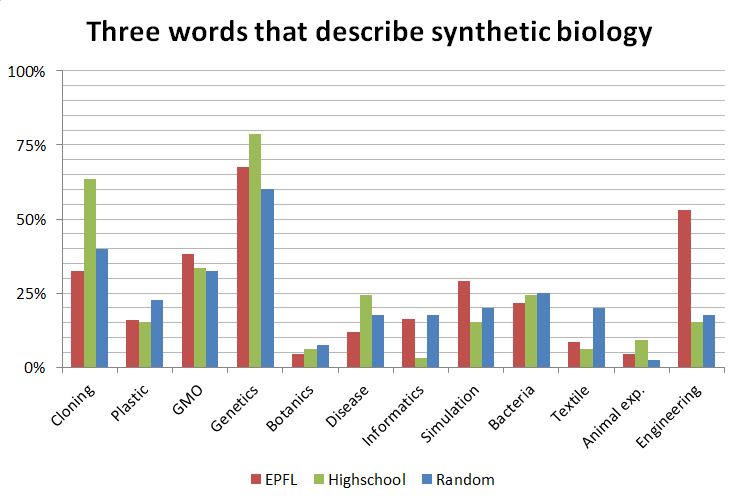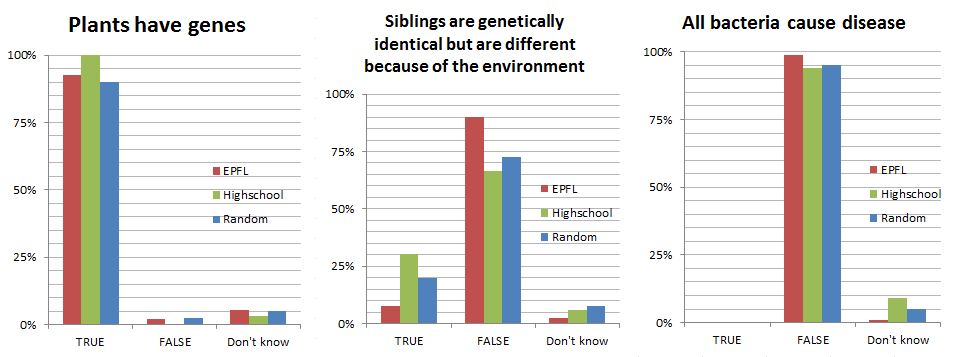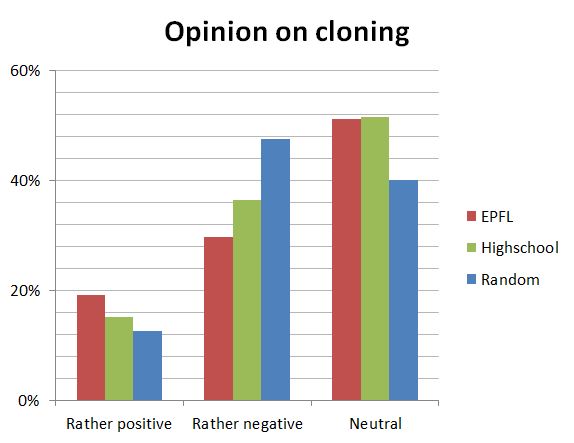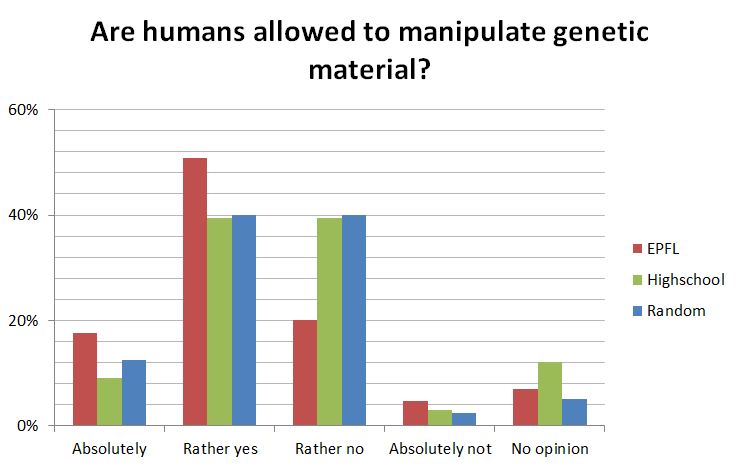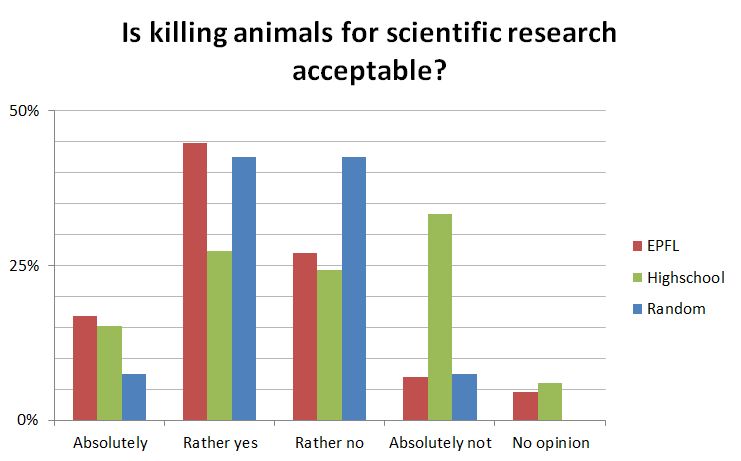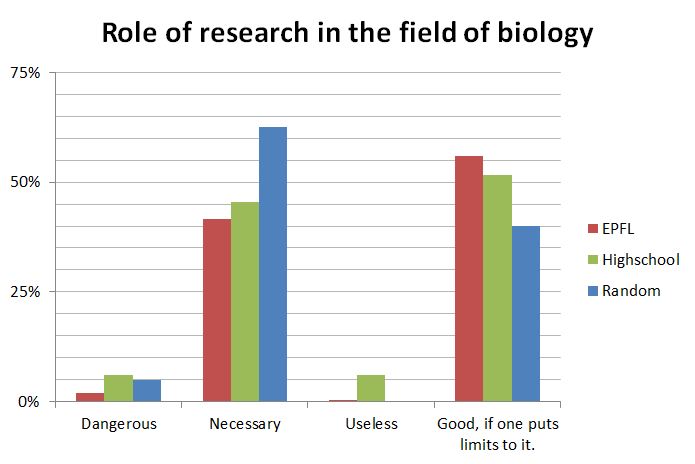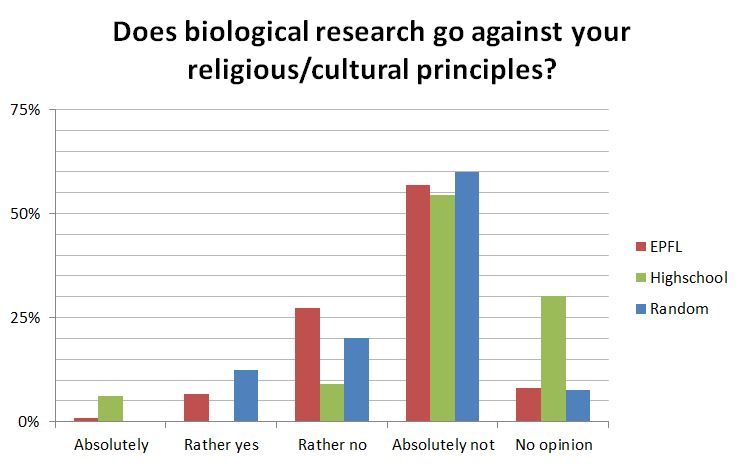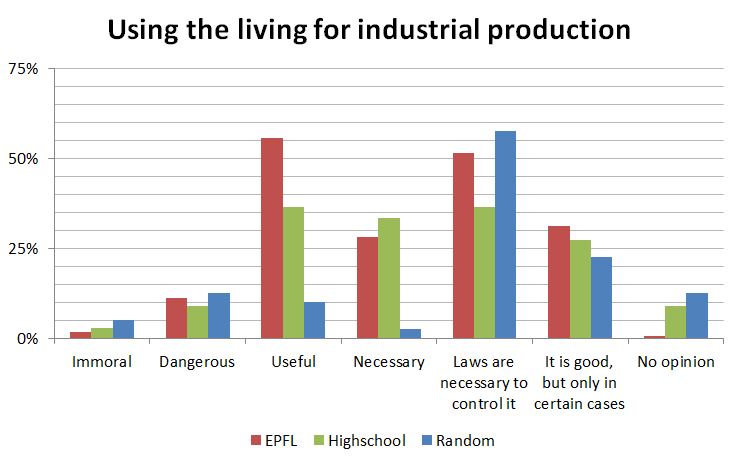Find the survey [http://kwiksurveys.com/app/rendersurvey.asp?sid=7swv7y7rd87kysz19907&refer= here].
Contents |
Three populations
We decided to analyse the answers coming from three distinct populations. The first one is a random population surveyed at the [http://www.salondulivre.ch International Fair for Books and Press] in Geneva, attended by people of all ages and backgrounds. The second population consists of second year high school students from [http://www.gymnasedebeaulieu.ch/home/ Gymnase de Beaulieu] Lausanne which have chosen a biological-studies concentration and the third population are students from [http://www.epfl.ch/ EPF Lausanne] (Bachelors and Masters) coming from all faculties.
The purpose of this analysis is to compare populations with differing levels of exposure to genetic engineering. A random population is less likely to have heard of synthetic biology than high school students with a biological-studies focus, and these high school students are less likely to have sufficient depth of study in the field when compared to EPFL students which are in an academic field.
Results
General knowledge
In order to evaluate the general knowledge our three populations have , we analyse the next 6 questions.
The words "Genetics" and "Cloning" seem popular in all of the three population when one mentions synthetic biology. The EPF Lausanne population is the only population to associate synthetic biology to engineering. It could be due to the fact that knowing iGEM is an EPFL student project, other students assume that the subject must have a link with engineering.
These very basic questions in genetics show that every population has a quite good general knowledge about what organisms have genes, that not all bacteria are harmful (the media helped by talking a lot about this subject). There some more confusion for the question on the genetic link between siblings, which is actually a trickier question than expected. Common believes tell us that our siblings are "the same blood" as we are and everyone talks about genes they have in common. So many people fell in the trap and answered that siblings have the same genes, thus are like clones, which obviously is incorrect. Even highschool students had this confusion, even though they're oriented in a biological track, but maybe haven't seen that much genetics yet.
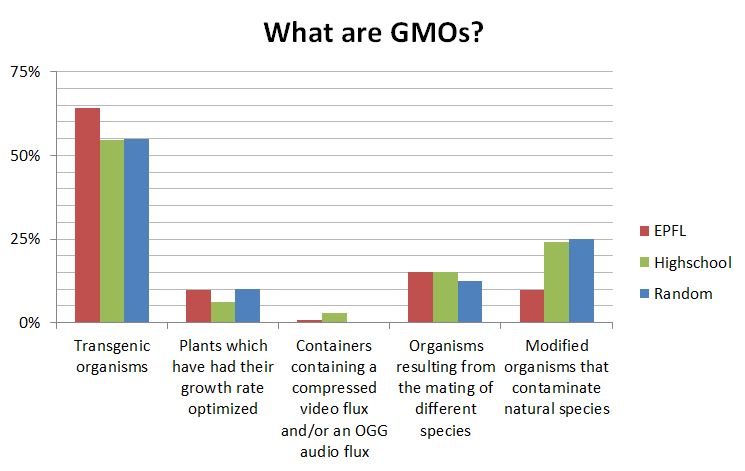
Ethic issues
The last 6 questions address ethical issues and fears people might have like cloning, genetic manipulation and using animals or other living organisms in industry or research.
When it comes to cloning, the opinions slightly differ between the three populations. The random population mostly has to 47% a rather negative opinion, followed by 40% of neutral opinions. Amongst the high school students, only 36% have a rather negative impression but more are neutral on the subject (51%). In the EPFL population as well half the people are neutral (51%) but less answered rather negative (30%) and it is the population in which we have the most positive impressions (19% against 15 and 12% in the two others). Here we can see that the impression people have about the word cloning is linked to the likelihood to be informed on the different levels of cloning that exist. People who are not in contact with a scientific field are less likely to know of other and more common ways of cloning (gene, bacteria, etc.) than whole organism cloning in science fiction subculture or in the media (sects pretending to have cloned a human being etc.).
What strikes the eye in the answers to this question is that the random and the high school students population are practically slit in two, the rather yes and the rather no to genetic manipulation (both around 40%). There are very few clear answers such as "absolutely" or "absolutely not", which tells us that the subject is very open to discussions, since the vast majority does not have an absolute answer and only slightly tends towards one side or another. With the visibility of genetics fields increasing, people probably become more aware of what is done, that scientists manipulate genetic material for reasearch, but at the same time we feel from the talks we had and from non-scientific people around us that the idea of manipulating genes is still a fear.
Again the random population is split between « rather yes » and « rather no » (both exactly 42.5%) but for high school students the opinions are a lot more diverse. In fact answers range from “absolutely” (15%) to absolutely not” and very interestingly this one was the most answered (33%), even though the students are biology oriented and chances are they already had to dissect animals in class and some of them are likely to continue in this track later at university. For the EPFL students, the answers are more in favor of sacrificing animals for research, with a vast majority of “rather yes” (45%) and the highest percentage of “absolutely” (16%) compared to the two other populations. About 27% still think “rather no”, but in general and probably due to closer contact with research institutes like the [http://isrec.epfl.ch/ Swiss Institute for Experimental Cancer Research ISREC] and others on campus using animal experimentation on a daily basis for research, EPFL students think that animal sacrifice is necessary to advance in those fields.
Even though opinions diverge more or less strongly on animal experimentation and genetic manipulation, when it comes to the role of research in biological fields, two answers stand out in all the populations: "Necessary" and "Good if one puts limits to it". Intrestingly, between these two choices, EPFL students are the population where more people think that limits are necessary with 55% of the answers, followed by high school students with 51% and then the random population with 40%. Maybe amongst the random population, many people don't necessarily associate research (which is looked at as good for human kind and honorable) with genetic manipulation, animal experimentation etc. which are highly debated and controversial. Also we could think that the more a population is exposed to research, the more people will realise the need to have appropriate rules to limit things getting in "wrong hands", the same way medical doctors have a harder time putting trust in other doctors because they're more aware of their human side.
 "
"
